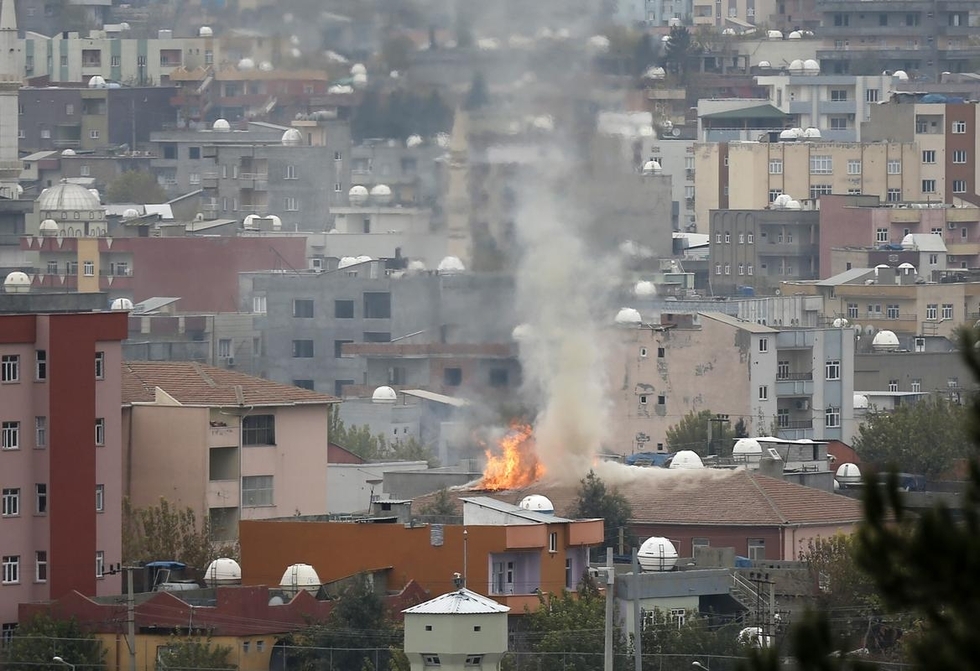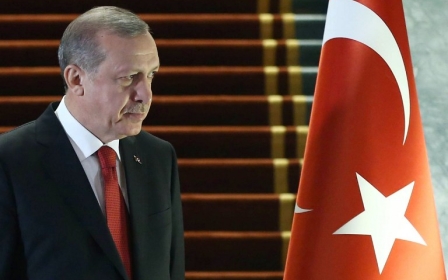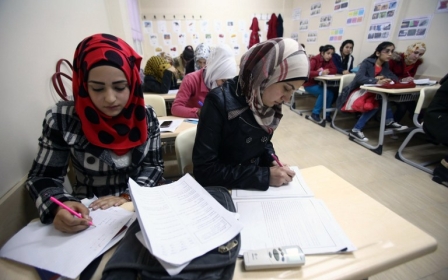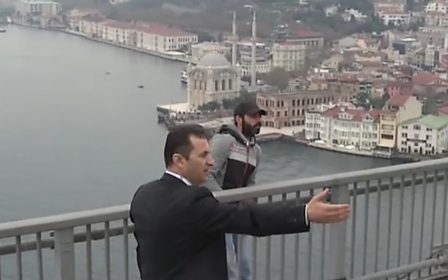Regular citizens bear brunt of pain as Turkey conflict rages

ISTANBUL, Turkey – Shopkeepers, as well as small- and medium-scale traders, are being forced to shutter their businesses in increasing numbers as the raging conflict in southeast Turkey moves to urban areas. And this is only serving to make the country’s most impoverished region even poorer.
Around 11,000 shops and 1,549 businesses have reportedly folded in the last 10 months alone in the region, according to a report compiled by an economist and columnist at Turkish newspaper Milliyet.
Thousands have also been displaced and now live in almost absolute poverty without even the most basic amenities, as the fighting intensifies and shows no signs of abating.
The Turkish state and the Kurdistan Workers’ Party (PKK) have been in a state of conflict since 1984. The conflict has cost more than 40,000 lives. The recent intensity of the conflict, however, is considered to be the fiercest in the more than three decade-long history of this ongoing war.
“Forget commerce, it is a warzone here in Cizre,” said Ahmet Payan, 42. “It is not even about earning a living anymore. We are simply faced with a situation of life and death.”
Payan, a businessman from Cizre who didn’t want his real name published fearing repercussions from the authorities for speaking his mind, said he had to close down his business three months ago. Payan owns a recreational facility on the outskirts of Cizre that includes a children’s park, a restaurant and other facilities. He said he had to lay off the 50 staff members who worked there. Cizre has been one of the worst-affected towns following the uptick in violence.
Payan says Cizre has been turned into a battlefield since the Kobane protests in October 2014.
Widespread, violent protests erupted in southeast Turkey after the Syrian town of Kobane across the border fell to the Islamic State (IS) group in 2014. The protests were the result of perceived Turkish inaction to prevent the fall of Kobane. The town was later taken back from IS control by Kurdish forces, some of whom were allowed to transit Turkish territory from northern Iraq.
“Our schools and hospitals are filled with soldiers and police. It is constant explosions, shelling, gunfire and teargas. People can’t even leave their homes. How could I keep my business running?” Payan told Middle East Eye.
State of constant curfew
Sahismail Bedirhanoglu, the president of the Southeast Industry and Businessmen’s Association, also despairs of the situation and warns of long-term consequences if the current climate continues to prevail.
“I don’t know how much longer it can go on like this. Even if you only take Diyarbakir’s Sur district into account, it has been under curfew for almost six months with the latest one now in place for around 20 days,” he told MEE. “All commerce has come to a standstill.”
Bedirhanoglu says he is stumped by how quickly the situation went from being one where hopes for peace had never been higher and a promising peace process was underway, to the current situation, which he says is the bleakest he has ever seen.
The past few years had witnessed unprecedented progress toward peace between the Turkish government and the PKK, but the process started to unravel after the Kobane protests of October 2014 and the situation has deteriorated rapidly since, leading to almost all-out conflict from July onwards.
“Sur is a historic district and home to the region’s jewellery and handicrafts artisans. It is also the regional distribution point for foodstuffs. Everything has stopped. It is a ghost town. Even bank branches had shut yesterday [22 December],” said Bedirhanoglu.
Bedirhanoglu, who also owns a hotel in Sur, said he had to finally shut it down 20 days ago.
“There was nothing more I could do. I have 58 staff working there and had to send them all on unpaid leave. It hurts, but I just couldn’t keep the hotel open.”
Bedirhanoglu said the latest report his association received from the city’s guild of financial advisers is dire.
“In Sur, 311 shopkeepers have applied to initiate closure proceedings. Around 56 have applied to start the process of relocating. There are hundreds more than have shut down but have made no official application so we have no records,” said Bedirhanoglu. “At least 10,000 businessmen, shopkeepers and employees have been affected in Sur alone.”
The Southeast Industry and Businessmen’s Association held a meeting with high-ranking government officials last week to ask for measures to address their concerns.
“We asked that all businesses in the southeast be allowed to postpone tax payments, insurance payments and bank loan payments given that we are unable to even open our businesses,” said Bedirhanoglu.
‘Relief measures nowhere near enough’
Prime Minister Ahmet Davutoglu, in an address to his party’s lawmakers in parliament on 22 December, vowed to address the needs of every single person that has been displaced or had to shutter their shops.
“We have never left any citizen to fend for themselves and uncared for, and neither will we do so in the future ... Anyone forced to relocate due to terrorism can apply to the governor’s office for assistance,” said Davutoglu.
He also promised business owners that they would be able to defer tax and insurance payments to a later date.
Bedirhanoglu believes it is a promising initial measure but not enough, while Payan is not placated and holds the state responsible for their plight.
“I know every conflict means two sides are involved and both are to blame. But when one side is the state and has set out to exterminate an entire people, we can see how insincere they have been all along,” said Payan.
“Where is all that talk of brotherhood, fraternity and being equal citizens? I am also very upset at my compatriots in other parts of the country. Why don’t you even make the slightest mention of our plight as Cizre burns?” he said.
Clashes show no sign of abating as the government refuses to contemplate talks or discussions and has repeatedly stated that it won’t stop its counter-offensive until the entire region is cleared of PKK elements.
“I don’t even know what condition my business facilities are in. Perhaps it has been occupied or even destroyed by shelling. It is too dangerous to try and go inspect it,” said Payan.
New MEE newsletter: Jerusalem Dispatch
Sign up to get the latest insights and analysis on Israel-Palestine, alongside Turkey Unpacked and other MEE newsletters
Middle East Eye delivers independent and unrivalled coverage and analysis of the Middle East, North Africa and beyond. To learn more about republishing this content and the associated fees, please fill out this form. More about MEE can be found here.




